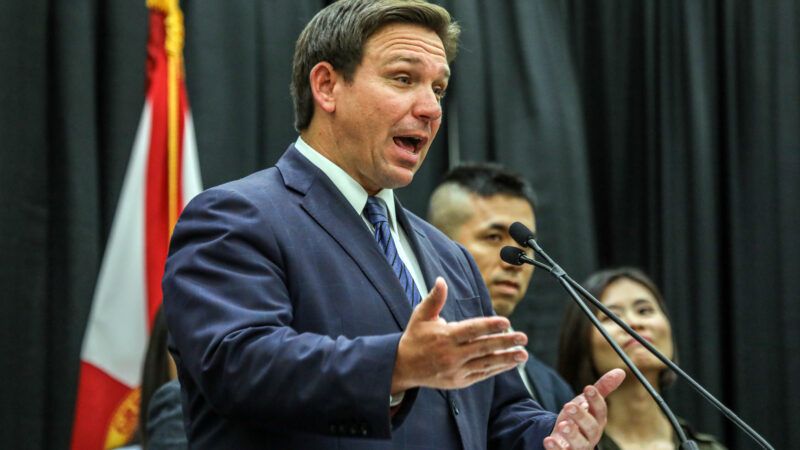For Florida Gov. Ron DeSantis, Political Stunts Are More Important Than Substance
Who cares if it’s legal if it generates politically advantageous outrage and attention?

When a federal judge ruled against the social media law championed by Florida's Republican Gov. Ron DeSantis, it wasn't much of a surprise: The law, which among other things forbade social media companies from appending their own speech to certain user posts and compelled social media companies to host speech by elected officials, was blatantly, obviously unconstitutional from the outset. Not incidentally, it was also incredibly corrupt, including a carve-out for Disney, the state's largest employer.
Florida's defense of the law was a legal embarrassment that asserted, among other things, that Section 230 of the Communications Decency Act, had effectively established "a law-free zone over the entire Internet," and insisted that the courts should view social media platforms as common carriers simply because they wield "massive power."
When a state lawyer appeared in court to defend the law, the lawyer couldn't answer easy questions about how the legislation was supposed to work in practice, to the point where the exasperated judge eventually said: "I want to know if you've ever dealt with a statute that is more poorly drafted."
Perhaps inadvertently, the judge had revealed the true purpose of the law. The statute was not designed to operate in the real world, or even to answer basic hypotheticals about how it might work in practice. It was not, in other words, drafted to function as a law.
Rather, it was written and passed to make a tendentious public point about supposed discrimination against conservative views on social media. DeSantis could then send out press releases declaring that he was guaranteeing "real Floridians across the Sunshine State" legal "protection against Silicon Valley elites" and counteracting intimidation by "leftist media and big corporations."
This wasn't a serious attempt to legislate. It was a stunt intended solely to generate attention for DeSantis in hopes of raising his political profile in advance of a possible presidential run—damn the obvious First Amendment violations.
DeSantis didn't care about the Constitution. He didn't care about the legal particulars. He cared about his campaign.
That's a trend for DeSantis, who has recently increased his reputation on the strength of political stunts of dubious legality or legislative value. For DeSantis, stunts are more important than substance.
DeSantis' scheme to fly a plane full of migrants to Martha's Vineyard is just the most recent example. DeSantis appears to have funded the flight with interest left over from state COVID relief funds that were granted as part of the $2 trillion American Rescue Plan passed by President Joe Biden and congressional Democrats last year. In 2021, DeSantis criticized that bill, passed entirely on partisan lines and funded by increasing federal debt, as being "designed basically to bail out the poorly governed states." A year later, he apparently has no qualms about using money derived from that bill to prop up what amounts to a shadow campaign for the GOP presidential nomination.
DeSantis can't even really make an argument that the plane ride to Martha's Vineyard directly helps Florida, since the flight originated in San Antonio, Texas. As Reason's Fiona Harrigan noted recently, the origination point raises further legal questions, since the program that apparently funded the flight was designated for transporting migrants "from this state"—"this state" being Florida. The flight briefly touched down in the Panhandle to refuel, but this is, at best, a legal stretch. The same goes for the budgetary authority used to pay for the flight, since it was explicitly designated for immigrants who are "unlawfully present," and not for people who are here seeking asylum. But the clearest reports indicate the migrants on the plan were likely to seek asylum, and not present unlawfully.
Yet again, none of this apparently matters to DeSantis, who has repeatedly prioritized stunts over substance.
The same goes for DeSantis' recent actions against Disney. Although the governor exempted the entertainment giant from his social media bill, earlier this year he embarked on a high-profile campaign to revoke the company's self-governing status. DeSantis made no effort to hide that his move was intended as punishment for Disney's decision to speak out against Florida's Parental Rights in Education bill, which critics have dubbed the "Don't Say Gay" bill, and which would restrict some forms of classroom discussion of gender or sexuality in public education.
DeSantis wasn't trying to govern constructively. He was trying to make a point, and raise his own profile, by punishing private political speech. That effort too was plagued by First Amendment and budgetary concerns, as Reason's Elizabeth Nolan Brown wrote at the time.
As usual, DeSantis evinced no obvious concern about the constitutionality or legal particulars. He'd found a way to generate politically advantageous outrage and attention.
Even the law that served as the basis for that dispute fit the same pattern: DeSantis' education bill was vague and poorly drafted, but clearly designed to shut down specific types of speech in schools—or at the very least to give DeSantis an opportunity to send out self-congratulatory press releases while ginning up campaign-boosting controversy and attention.
DeSantis' supporters sometimes point out that he has executive experience that would be an asset in the White House. But much of DeSantis' experience as an executive seems to consist of using state resources to bolster his political fortunes, with little benefit conferred to the people he's supposed to serve.
These stunts aren't designed to help "real Floridians"; they're designed to boost the political career of one very particular Floridian.


Show Comments (214)